Mental Health and Nursing Care of Individuals with Cancer and Their Families
A special issue of Healthcare (ISSN 2227-9032). This special issue belongs to the section "Nursing".
Deadline for manuscript submissions: closed (31 October 2023) | Viewed by 18518
Special Issue Editor
Interests: supportive care; cancer care; palliative care; psychosocial oncology; oncology nursing; survivorship; clinical nursing research
Special Issues, Collections and Topics in MDPI journals
Special Issue Information
Dear Colleagues,
Cancer and its treatment have many consequences for individuals who are diagnosed and their family members. These consequences can be physical, emotional, social, psychological, spiritual, informational and/or practical. They can begin at the time an individual believes they may be diagnosed with cancer and continues throughout diagnosis, treatment, and follow-up care. In some cases, they continue for many years following the treatment interval.
These consequences can create challenges for both the individual and the family which can have a profound influence on their mental health. All experience psychosocial or emotional distress to some degree. The resulting impact is often cyclical over the course of the cancer experience, rising and falling repeatedly, and vary from one person to another.
An in-depth understanding of the impacts, and the factors which affect living with them on a daily basis, is necessary as a basis for providing quality nursing care to those with cancer or their family members. As well, evaluation of the effectiveness of interventions is required to provide evidence-based care. Currently, gaps remain in the evidence nurses require for providing quality care across the cancer continuum for those experiencing mental health issues.
This special issue is seeking papers/articles focused on the topic of mental health and nursing care of individuals with cancer and/or their family members. We are seeking original research or program/intervention evaluations directed toward understanding patient and family member challenges that impact on the mental health of individuals with cancer and their families who are living through a cancer experience.
Reviews and both quantitative and qualitative designs will be considered.
Prof. Dr. Margaret Fitch
Guest Editor
Manuscript Submission Information
Manuscripts should be submitted online at www.mdpi.com by registering and logging in to this website. Once you are registered, click here to go to the submission form. Manuscripts can be submitted until the deadline. All submissions that pass pre-check are peer-reviewed. Accepted papers will be published continuously in the journal (as soon as accepted) and will be listed together on the special issue website. Research articles, review articles as well as short communications are invited. For planned papers, a title and short abstract (about 100 words) can be sent to the Editorial Office for announcement on this website.
Submitted manuscripts should not have been published previously, nor be under consideration for publication elsewhere (except conference proceedings papers). All manuscripts are thoroughly refereed through a single-blind peer-review process. A guide for authors and other relevant information for submission of manuscripts is available on the Instructions for Authors page. Healthcare is an international peer-reviewed open access semimonthly journal published by MDPI.
Please visit the Instructions for Authors page before submitting a manuscript. The Article Processing Charge (APC) for publication in this open access journal is 2700 CHF (Swiss Francs). Submitted papers should be well formatted and use good English. Authors may use MDPI's English editing service prior to publication or during author revisions.
Keywords
- cancer care
- mental health
- family care
- patient perspectives
- caregiver health
- family involvement
- nursing care







